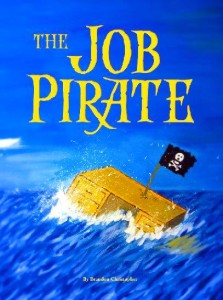A guest post by Brandon Christopher, author of The Job Pirate
As both a novelist and freelance copywriter-for-hire, I have discovered two very different processes of writing—one for the literary voice, and one for the advertising voice. Both are living, breathing methods of putting thoughts onto paper, yet both styles of wordsmithing are as different as night and day.
 When I’m working on a novel or short story, I tend to cultivate the story. The story actually tells me where it wants to go, and I listen to it. I am merely a documenter—actually, a wartime reporter—of whatever imaginary scenario is happening in my head. When writing creative literature, there are no time constraints, and that’s the key. I can come back and rewrite the same paragraph 30 times if I want to. Literature is freedom. I can throw in words like “loquacious,” and no one can tell me to take it out (although my publisher recently told me that three times was too many for one manuscript). When writing literature, you tend to drink too much wine, consume too much coffee on a weeknight, and smoke too many cigarettes—but that’s all right, because that type of writing is like having a license of liberty. Because when you’re writing it, you aren’t you. That’s the way it has to be. You are the characters in your mind, you are the evolving storyline, you are all the dialogue. You are a hundred little things happening simultaneously, with only a mere ten fingers to try and capture each one and type them into existence. You must never be the fear of lung disease, or the recollection of work in the morning—reality-laden thoughts like these have to be silenced at all costs. And when deep into the literary writing process, you’ll happily sit at your desk for hours and days and weeks and months trying to find the best possible phrasing for that awesome bit of dialogue your protagonist shouts from his window. And you love every goddamn second of it.
When I’m working on a novel or short story, I tend to cultivate the story. The story actually tells me where it wants to go, and I listen to it. I am merely a documenter—actually, a wartime reporter—of whatever imaginary scenario is happening in my head. When writing creative literature, there are no time constraints, and that’s the key. I can come back and rewrite the same paragraph 30 times if I want to. Literature is freedom. I can throw in words like “loquacious,” and no one can tell me to take it out (although my publisher recently told me that three times was too many for one manuscript). When writing literature, you tend to drink too much wine, consume too much coffee on a weeknight, and smoke too many cigarettes—but that’s all right, because that type of writing is like having a license of liberty. Because when you’re writing it, you aren’t you. That’s the way it has to be. You are the characters in your mind, you are the evolving storyline, you are all the dialogue. You are a hundred little things happening simultaneously, with only a mere ten fingers to try and capture each one and type them into existence. You must never be the fear of lung disease, or the recollection of work in the morning—reality-laden thoughts like these have to be silenced at all costs. And when deep into the literary writing process, you’ll happily sit at your desk for hours and days and weeks and months trying to find the best possible phrasing for that awesome bit of dialogue your protagonist shouts from his window. And you love every goddamn second of it.
Now put all that aside for a second, because we’re going to describe the process of the copywriter—or, the advertising writer—which is completely different from the literary writer. A lot of people might define a “writer” as anyone who writes, and assume that writing is just writing—just pen to paper and Boom! Nothing could be further from the truth, in my opinion. These two styles are at opposite ends of the writing spectrum, because copywriting is basically writing poetic word-bursts at a very, very fast rate. There is no love with this form. It’s a craft, not an art. You create punchy sentences from a list of words that have been vetted by years of marketing experience and poll groups. You cannot use the word “loquacious,” no matter how badly you want to. You sell a product using polite little directives and descriptions. You do not tell a story. You do not create. You only con people. It’s the type of writing that was born in the left side of the brain, steeped in analytical, objective thinking.
There is a point to describing these two variations of the writing process, because I have been doing both on a daily basis for over 10 years: copywriting for a paycheck during the days, then working on novels at night. I have been able to observe both of my mind’s voices—the left and right sides—at work, struggling to find the proper rulebook for the game at hand. And I discovered the key to really good writing is to embrace them both. You have to find the proper balance between them—that’s very important. But still, you have to embrace both the right and left sides of the brain for an honest, well-rounded story.
A child needs a parent. Meat needs a vegetable. God needs a devil. The creative writer needs the advertising writer. Just find that balance, that’s the key. Add a little more of the left side when you’re writing dialogue, and a little more right side once you’re deep inside the story and filling the walls with paintings.
http://youtu.be/ipFv3VuiXq4
Brandon Christopher is an author, copywriter, artist, private investigator and career connoisseur. His latest novel, The Job Pirate, which details his absurd journey through 82 different jobs, was  released in January 2013. His other novels include Dirty Little Altar Boy and Nightville. He lives in Seattle, WA, but prefers to pretend it is Paris in the 1920s.
released in January 2013. His other novels include Dirty Little Altar Boy and Nightville. He lives in Seattle, WA, but prefers to pretend it is Paris in the 1920s.
